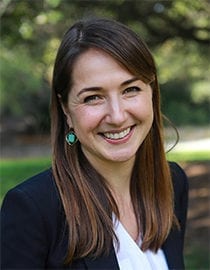
By Andrew Cohen
Governor Jerry Brown has appointed Jordan Diamond ’08 to the California Ocean Protection Council (COPC).
Executive director of Berkeley Law’s Center for Law, Energy & the Environment (CLEE) and co-director of the Law of the Sea Institute, Diamond will serve a four-year term and become the youngest member of the council’s seven-person leadership team. COPC also has a full-time research staff headed by executive director and alumna Deborah Halberstadt ’05.
Created in 2004, the Council works to maintain healthy coastal and ocean ecosystems and the services and economies they support by ensuring that decisions are based on the best available science. COPC also coordinates the activities of ocean-related state agencies and recommends law and policy reforms to the governor and state legislature.
“One of the greatest challenges in ocean and coastal management is effective coordination,” Diamond says. “There are myriad agencies and laws involved in ensuring the healthy and vitality of our coastal resources, which makes an entity like this critical. I’m honored to help take on those challenges.”
The state’s coastal economy and resources are major drivers of its economic health. A longtime national leader in ocean management innovation, California is currently considering a proposal for the first floating wind turbine.
Seeing the big picture
The Council meets four to five times a year, mostly in Sacramento. With federal proposals to open offshore areas for oil and gas drilling, its work will likely gain increased attention.
“The majority of our resource management laws were created in silos,” Diamond says. “While we’ve recognized the pitfalls of this, it’s still a struggle to manage things more holistically in practice. We need to look at our ecosystem as a whole when formulating policy. That means making sure our resource managers have the tools and means to collaborate effectively, and that our different data systems can communicate with each other.”
Before returning to Berkeley Law in 2014 to lead CLEE, Diamond held several positions during a six-year stint at the Environmental Law Institute. As co-director of the ocean program, she helped improve and integrate Gulf of Mexico coastal conservation and restoration, support the role of Alaska Natives and other indigenous peoples in Arctic marine governance, and analyze offshore energy management systems.
In 2013, Diamond won the American Bar Association Section of Environment, Energy, and Resources’ Distinguished Environmental Advocates: The Next Generation award. In law school, she earned a certificate in environmental law and was managing editor of Ecology Law Quarterly. As an undergrad at Wesleyan University, she received the Sease Prize for outstanding work in environmental science.
“A lot of what the Council does is similar to our work at CLEE,” Diamond says. “Our approach on how best to integrate science, law, and policy involves striving to ensure we have the best information available and to use it in transparent, accountable ways. That’s also fundamental to the Council’s mission, and to maintaining the rule of law.”